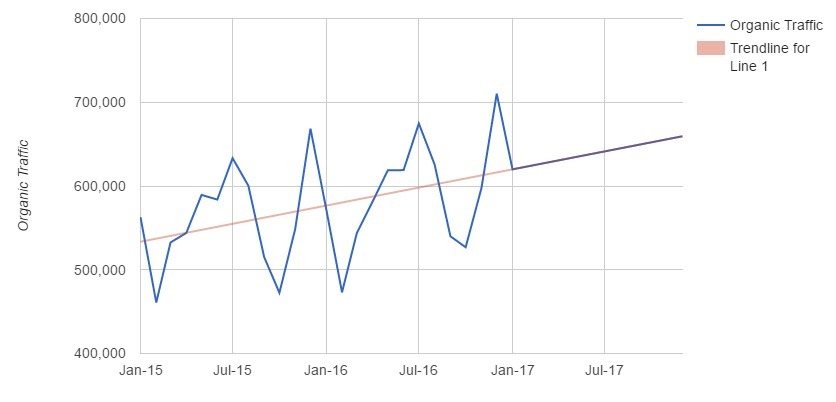8 min to read
How To Forecast SEO Outcomes With Better Precision & Transparency?

Forecasting SEO Outcomes
If you have started to focus on your website's SEO, you must have thought to predict what impact your efforts will have on the business. It is a common tendency of human brain to try to forecast your results before you’ve even started. It’s great as business to set ambitious goals, but it can be tough to accurately forecast SEO outcomes – especially when you’re just getting started.
CodeDesign is a leading digital marketing agency ranked #1 in Lisbon, Portugal. You could work with us to accelerate your business growth.
Step #1: Set Realistic Expectations
The first step in forecasting SEO outcomes is to set realistic expectations. This means being honest about what you can and cannot control. For example, you can control on-page optimization and link building, but you can’t control the constant Google’s algorithm updates. When setting expectations, it’s also important to keep in mind that SEO is a long-term strategy. It can take months – even years – to see results. This is why it’s important to set realistic short-term and long-term goals. Short-term SEO goals might include things like improving your click-through rate or ranking for a few key keywords. Long-term goals might include things like driving 80% of your website’s traffic from organic search or increasing your organic revenue by 70%.
Step #2: Identify Your SEO KPIs
The next step in forecasting SEO outcomes is to identify your SEO KPIs. These are the metrics you’ll use to measure your progress and determine whether you’re on track to meet your goals.
Some common SEO KPIs include:
- Organic traffic
- Organic revenue
- Conversion rate
- Click-through rate
- Bounce rate
- Pages per session
- Average session duration
You can also use web analytics tools like Google Analytics to track your progress over time. This will give you a clear picture of how your SEO efforts are impacting your business.
Step #3: Use Data to Predict Outcomes
Once you’ve identified your SEO KPIs, it’s time to start using data to predict outcomes. The best way to do this is to look at historical data. For example, if you want to predict how much organic traffic you’ll get next month, look at how much traffic you’ve got in past months. You can also use data from other websites to predict outcomes.
For example, if you want to predict how much traffic a certain keyword will generate, you can use Google’s Keyword Planner tool. This tool will show you how many people are searching for that keyword each month. Finally, you can use data from your competitors to predict outcomes. For example, if you want to predict how much traffic you’ll get from a certain keyword, you can use a tool like SEMrush. This tool will show you how much traffic your competitors are getting from that keyword.
Step #4: Use Models to Predict Outcomes
Once you’ve collected data, it’s time to start using models to predict outcomes. Models are mathematical equations that use data to predict future outcomes. There are a variety of different models you can use to predict SEO outcomes.
Some common models include linear regression, logistic regression, and decision trees. You can use these models to predict things like how much traffic a certain keyword will generate or how much revenue you’ll generate from organic search.
Step #5: Translate Results Into Business KPIs
Once you’ve predicted SEO outcomes, it’s time to start translating results into business KPIs. This means taking your predictions and turning them into actionable insights. For example, if you’ve predicted that a certain keyword will generate 100 visits per month, you can use that information to set a goal for your business. You might set a goal to increase form filling rate from that keyword by 5% over the next month.
What Does Accurate & Transparent Mean?

Accuracy in SEO
Accuracy and transparency are two of the most important factors in any business relationship. They're what enable you to trust the people you're working with and understand the value they're providing.
The overall accuracy of an SEO solution is the percentage of actual results it delivers compared to the total number of results it promises. If a solution promises that you'll be ranked 1st for a given keyword, and you are, that's 100% accuracy.
What's more important in SEO, though, is the overall transparency of the campaign. Regular transparent reports enables you to determine where and why you might be gaining or losing traffic. Without clear data, you can still see traffic growth, but you won't know why, which makes it tough to replicate. It can be challenging to stop the loss and get more visitors to your website if you lose traffic for an unknown reason.
What Is SEO Outcome Forecasting?
Forecasting your SEO outcomes is a skill that can be learned and improved over time with practice. It's essentially predicting which changes you make to your website will result in which types of improvements in your organic search visibility.
There are several different factors to consider when forecasting your SEO outcomes, including:
-Your current search engine visibility
-The competitiveness of your industry
-The potential reach of any changes you make
-The ability of your site to rank for relevant keywords
What Are the Benefits of SEO Outcome Forecasting?

SEO Outcome Forecasting
So for your business, you're looking to invest in SEO? Great! But before you do, you must ensure you're prepared for the journey. That's where forecasting your SEO outcomes comes in.
When you forecast your SEO outcomes, you can better understand your efforts' potential results. This way, you can set realistic expectations and avoid nasty surprises down the road. Forecasting provides transparency into the entire process, which builds trust between you and your team.
It's a valuable tool that should be a part of any successful SEO campaign.
The Importance Of Knowing Where You Rank
Knowing where you rank is a crucial part of any SEO strategy. It allows you to develop realistic goals and understand where you're losing out compared to your competitors. Knowing where you rank will enable you to plan and forecast future revenue based on the keywords you're targeting and the traffic you're receiving.
There are too many variables at play to guarantee that level of precision. However, you could confirm your rankings accurately with the help of tools like Google Search Console and Google Analytics.
The Importance Of Knowing How Much Traffic You'll Receive
Knowing how much traffic you receive from each keyword is just as important as knowing where you're ranking. This is the most valuable insight that businesses could use to see how their campaigns are working. However traffic is not equal to success in SEO.
After all, they may not be ranking for the keywords that would generate the highest revenue. It is estimated that 80% of all businesses are not reaching their full potential. This is mostly due to the businesses not being ranked for the right keywords or the keywords that will generate the most sales for them.
How to Forecast SEO Outcomes With Better Precision?
There are a few things you need to do to make this happen. First, you need to have a good understanding of what's involved in SEO. You need to know which strategies work best for your business and what results you can realistically expect.
Second, you need to have a solid tracking system in place. This will help you measure the progress of your campaigns and see how they're impacting your bottom line.
Finally, you need to be patient! SEO is not a quick fix, and it may take some time before you see any significant results. But if you're diligent and stick to it, you will eventually see improvement.
How to Make Your Forecasts More Transparent?
The first step is always to use historical data as the basis for your forecasts. This will give you a good idea of what's possible and how likely certain outcomes are. Once you have that baseline, you can start to make adjustments based on current market conditions.
Make sure your forecasts are transparent, so your clients can understand how you reached your conclusions. And always be prepared to explain the risks and uncertainties associated with any predictions you make.
What Are the Different Types of SEO Outcome Forecasting Methods?
When it comes to SEO, there are a few different types of outcome forecasting methods.
The first is to see how traffic comes to your website and what works and doesn't. This is where you look at the traffic you've been getting from organic searches over a period of time and try to predict how much traffic you'll be getting in the future.
The second is to use trends. This is where you look at what's popular right now and try to guess how that will impact your traffic in the future.
The third is to use projections. This is where you use your understanding of how search engine algorithms work to predict how your website will rank in the future.
And the fourth is to use expert opinions. This is where you ask an expert for their thoughts on how things will play out. Our experienced SEO professionals at CodeDesign are always willing to help.
Conclusion
To summarize, the best SEO agency will give you a more accurate and precise understanding of your site's performance and how much traffic it would receive from Google. You need to constantly analyze which keywords brought you traffic, what is the volume trend for them, and what backlink strategy do you have in place.
FREQUENTLY ASKED QUESTIONS:
1. How do you forecast organic traffic growth?
There is no one definitive answer to this question. However, some methods for forecasting organic traffic growth include using data from previous periods to estimate future growth, using market analysis and trends to predict future growth, and using mathematical models to forecast traffic growth.
2. How do you calculate ROI for SEO?
The ROI of SEO can vary greatly depending on the specific industry, business, and goals involved. However, some common methods of calculating ROI for SEO include taking into account the value of organic traffic, leads, and sales generated from SEO efforts, as well as the cost of the SEO campaigns themselves.
3. What is a good CTR in SEO?
It largely depends on the individual SEO campaign and what the goals are. However, a CTR (click-through rate) that is higher than average can be seen as a good sign that the SEO efforts are working well. On Google AdWords paid search results, the typical good click through rate is around 2%. By using this as a benchmark, anything above a 2% CTR may be regarded as above average.
4. What percentage of clicks goes to the first 3 results on Page 1?
It is estimated that approximately 54.4% of all clicks go to the first three results on Page 1. This is because people tend to trust the results that are displayed first and are more likely to click on them.
5. How do you measure SEO success?
There are a number of ways to measure SEO success, but one of the most common is through web traffic data. This can be measured through website analytics tools like Google Analytics. Other ways to measure SEO success include things like lead generation and conversion rate data.

About Bruno GavinoBruno Gavino is the CEO and partner of Codedesign, a digital marketing agency with a strong international presence. Based in Lisbon, Portugal, with offices in Boston, Singapore, and Manchester (UK) Codedesign has been recognized as one of the top interactive agencies and eCommerce agencies. Awarded Top B2B Company in Europe and Top B2C company in retail, Codedesign aims to foster personal relationships with clients and create a positive work environment for its team. He emphasizes the need for digital agencies to focus on data optimization and performance to meet the increasingly results-driven demands of clients. His experience in digital marketing, combined with a unique background that includes engineering and data, contributes to his effective and multifaceted leadership style. |

About CodedesignCodedesign is a digital marketing agency with a strong multicultural and international presence, offering expert services in digital marketing. Our digital agency in Lisbon, Boston, and Manchester enables us to provide market-ready strategies that suit a wide range of clients across the globe (both B2B and B2C). We specialize in creating impactful online experiences, focusing on making your digital presence strong and efficient. Our approach is straightforward and effective, ensuring that every client receives a personalized service that truly meets their needs. Our digital agency is committed to using the latest data and technology to help your business stand out. Whether you're looking to increase your online visibility, connect better with your audience, get more leads, or grow your online sales. For more information, read our Digital Strategy Blog or to start your journey with us, please feel free to contact us. |
CodeDesign is leading:
- Digital Agency
- Digital Marketing Agency
- Digital Ecommerce Agency
- Amazon Marketing Agency
Feel free to contact us to see the unprecedented growth of your business.

Add comment ×